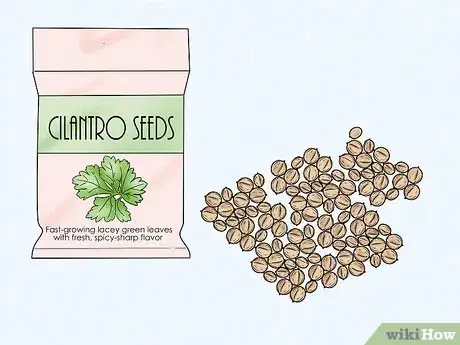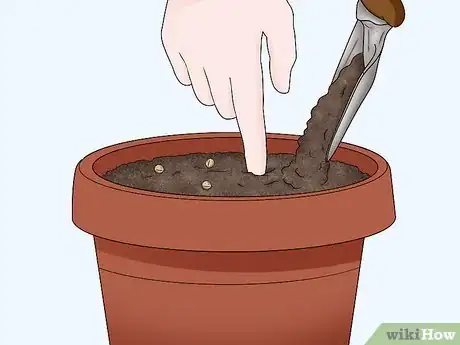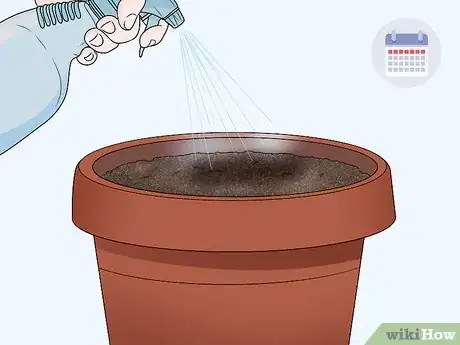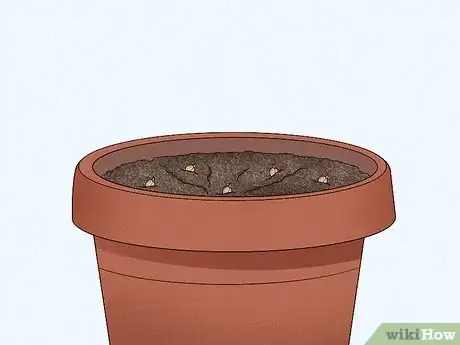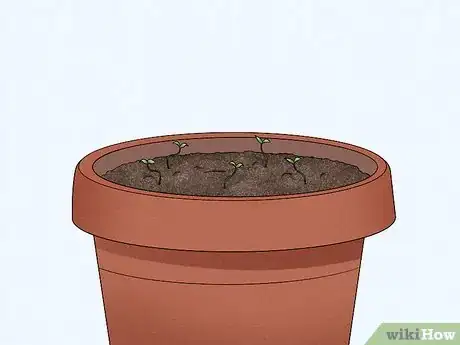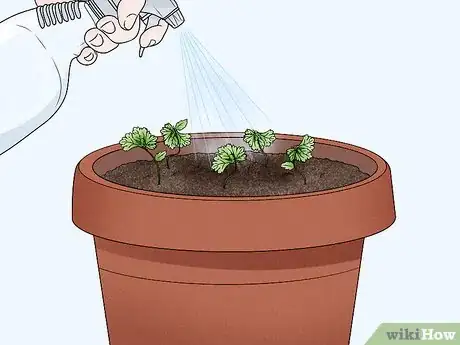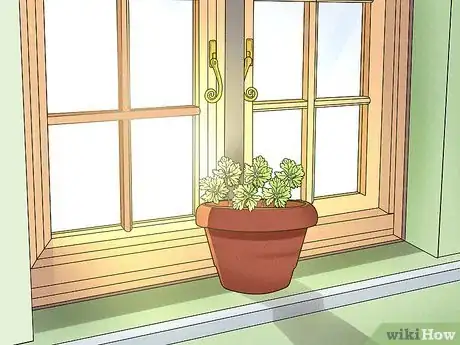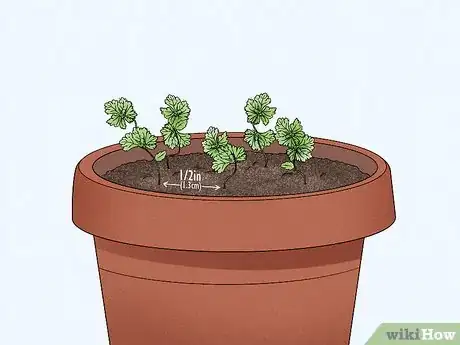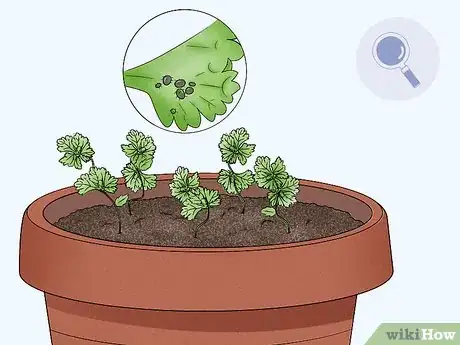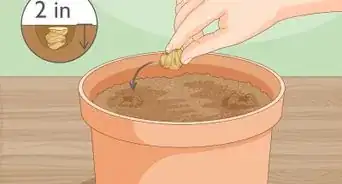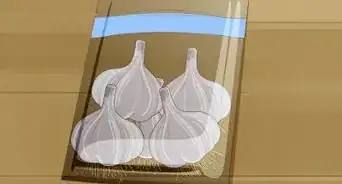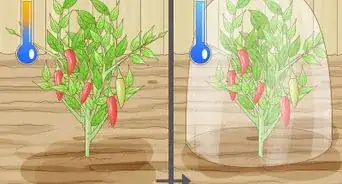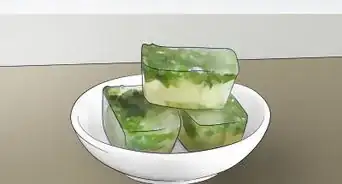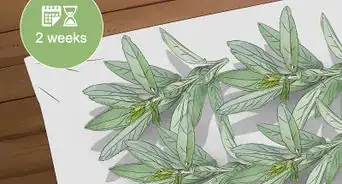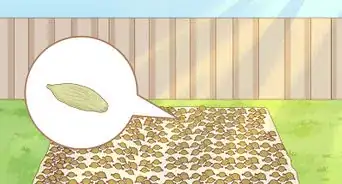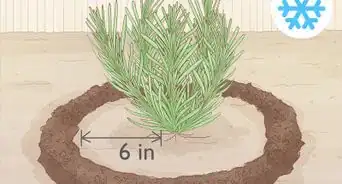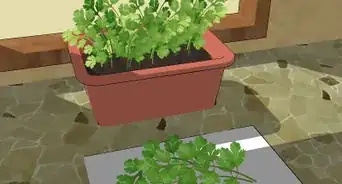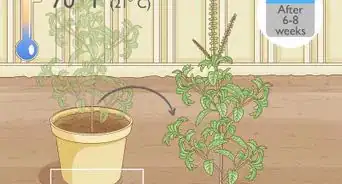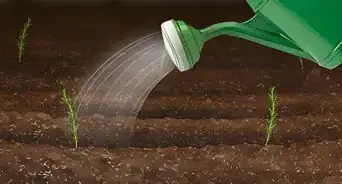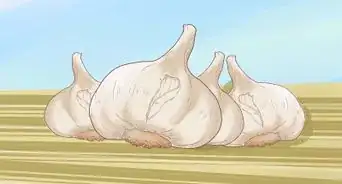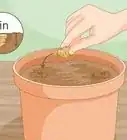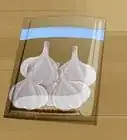This article was co-authored by Jon Rowland and by wikiHow staff writer, Hunter Rising. Jon Rowland is a Plant Specialist and the Founder of the Green House Center blog. With over eight years of plant and garden experience, he specializes in greenhouse care, lawn and garden maintenance, and home appliance recommendations. Jon aims to share his knowledge so that others can live a more convenient, efficient, and environmentally friendly lifestyle.
There are 7 references cited in this article, which can be found at the bottom of the page.
This article has been viewed 94,374 times.
Cilantro can be a hard to grow from seed as the setting must be just right to create seed germination. Cilantro seeds can easily catch mold/fungal diseases and make any chances of sprouting impossible. This article will show you how to germinate cilantro seeds indoors, in a pot, next to other plants, faster germination, etc.
Steps
Preparing the Soil
Germination
-
1Keep the soil moist and expect to see seed germination around 7 days after the seeds were planted.[5]
-
2After 7 days or less, under the soil the cilantro should have a white sprout coming out of the seed. You can check by gently uncovering the soil with your fingers and exposing the seed.[6]
-
3After another 2-3 days, you should see a green sprout pushing through the soil. If you uncovered the sprout than a green sprout should be visibly coming out of the seed.[7]
Care for Cilantro Seedlings
-
1
-
2The seedling should have full sun for a few hours. The seedling should not have more than 4/5 hours of full sunlight or else it can wilt and die.[10]
- After 2-3 weeks, you can gradually increase the outdoor exposure of the plants and acclimatize them to the natural environment. Then transplant them outside.[11]
-
3Cilantro seedlings can be grown together but about 1⁄2 inch (1.3 cm) apart.[12] If you calculate the wrong number of seeds, the soil might be too tight to grow them all. You should remove extra plants so that the remaining cilantro seeds can thrive. You can also re-pot the plant and transplant it to another pot.[13]
-
4Make cilantro immune to aphids. Kill most of the aphids, but leave a few to teach the cilantro to be immune and thrive even with aphids.[14]
- Usually, aphids will always find their way to cilantro plants.
- If plants are growing slower than usual, aphids could be the cause.
Community Q&A
-
QuestionFifteen days ago, I planted a row 75 feet long of cilantro, and not a single seed germinated. Any suggestions?
 Community AnswerYour question posted in February, and 15 days ago was January. Depending on your zone, most likely you planted the seeds during winter. If you're going to plant in winter, it is best to so indoors, and then transplant the seeds outdoors after the last frost.
Community AnswerYour question posted in February, and 15 days ago was January. Depending on your zone, most likely you planted the seeds during winter. If you're going to plant in winter, it is best to so indoors, and then transplant the seeds outdoors after the last frost.
Warnings
- Cilantro plants may grow slower than usual due to aphids eating the younger leaves or where they are not easily seen⧼thumbs_response⧽
References
- ↑ https://www.burpee.com/gardenadvicecenter/herbs/cilantro/all-about-cilantro/article10222.html
- ↑ Jon Rowland. Plant Specialist. Expert Interview. 7 September 2021.
- ↑ https://edis.ifas.ufl.edu/mv051
- ↑ https://www.youtube.com/watch?v=6yRt44-LuZM
- ↑ https://living.thebump.com/germinate-cilantro-6605.html
- ↑ https://www.burpee.com/gardenadvicecenter/herbs/cilantro/all-about-cilantro/article10222.html
- ↑ https://www.johnnyseeds.com/on/demandware.static/-/Library-Sites-JSSSharedLibrary/default/dw49416348/assets/information/8306-cilantro-production.pdf
- ↑ Jon Rowland. Plant Specialist. Expert Interview. 7 September 2021.
- ↑ https://www.almanac.com/plant/coriander-and-cilantro
- ↑ https://www.almanac.com/plant/coriander-and-cilantro
- ↑ Jon Rowland. Plant Specialist. Expert Interview. 7 September 2021.
- ↑ https://www.almanac.com/plant/coriander-and-cilantro
- ↑ Jon Rowland. Plant Specialist. Expert Interview. 7 September 2021.
- ↑ https://www.almanac.com/plant/coriander-and-cilantro
About This Article
Cilantro is a delicious addition to all kinds of dishes, and you can grow your very own at home by germinating cilantro seeds in soil. Choose a pot about 12 inches deep for your seeds so there’s plenty of room for the roots. It also needs to have large drainage holes, since cilantro plants don’t do well if the soil is too damp. When you plant the seeds, place them in rows 2 inches apart on the top of the soil. Then, cover them with a layer of soil and water them. To speed up the germination process, cover the pot with plastic wrap. Place it near a south-facing window so the seeds get plenty of sunlight, which will create a humid climate in the pot that encourages growth. After 7 to 10 days, you should see shoots beginning to grow. For tips on which potting soil is best for growing cilantro, read on!


